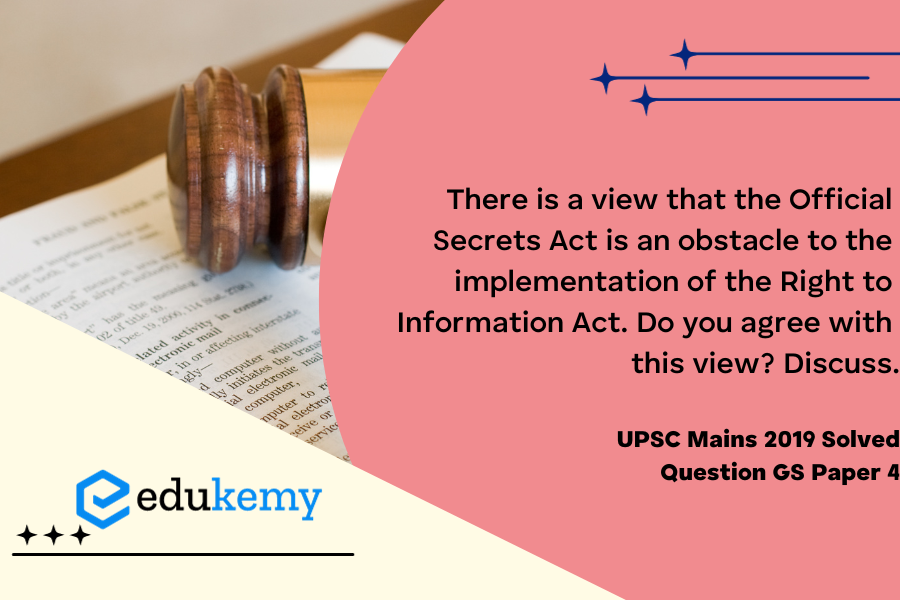The intersection between the Official Secrets Act and the Right to Information Act has long been a subject of deliberation, giving rise to a contentious view that the former serves as a hindrance to the effective implementation of the latter. The Official Secrets Act, designed to safeguard sensitive government information, often raises concerns about potential clashes with the principles of transparency and openness espoused by the Right to Information Act. Critics argue that the stringent provisions of the Official Secrets Act impede citizens’ access to vital information, creating a legal barrier that undermines the very essence of the Right to Information. This debate underscores the delicate balance required between national security imperatives and the democratic right of citizens to access information. Exploring the nuances of this intricate relationship is essential for a comprehensive understanding of how these legislative frameworks coexist and impact the democratic fabric of a nation.
Tag: Information sharing and transparency in government, Right to Information.
Contents
Decoding the Question:
- In the Introduction, try to mention a recent case.
- In Body,
- Mention some provisions.
- Explain how OSA is an obstacle to the implementation of the RTI Act.
- Write the way forward.
- Try to conclude with a balanced opinion.
Answer:
The government has sought action against a newspaper and news agency under the Official Secrets Act, of 1923 for publishing classified documents related to India’s deal to buy 36 Rafael jets from France.
However, the Judiciary made it crystal clear and dispelled the doubts many of us have regarding the Officials Secrets Act (OSA) being an obstacle to the effective implementation of the Right to Information Act.

Following are the provisions about the interactions of OSA and RTI Act potential conflict:
- In case of conflict between these two laws, the provisions of the RTI Act will override those of the OSA.
- Section 22 of the RTI Act states that its provisions will have effect despite anything inconsistent with them in the OSA.
- Under Section 8(2) of the RTI Act, a public authority may allow access to information covered under the OSA, “if the public interest in disclosure outweighs the harm to the protected interests”.
- RTI under Section 24, mandates even security and intelligence organizations to disclose information on corruption and human rights violations.
However, The Official Secrets Act (OSA) was enacted by the British Government in 1923, to curb its Enemy States, acts contrary to the provisions of RTI. Not only is it anachronistic and lacks usage in a liberal, modern-day democracy, but it also creates obstacles in the implementation of RTI, in the following ways:
- Colonial era act.
- Majorly used by the government to withhold information from citizens by citing security concerns.
- also used to cover up government impropriety.
- Used as a draconian weapon of threat against Journalists and activists to unearth governmental shortcomings.
- Used to silence specific investigations undertaken by citizens or civil society.
- This may lead to wrongful suspicion of spying on citizens eg: S Nambi Narayan,an eminent ISRO scientist, was investigated in the ISRO spy case. He faced a criminal trial under OSA and was acquitted now after 24 long years.
Right to Information (RTI), 2005 is a path-breaking legislation that brought in an era of transparency in the Indian governance system. It empowered the masses in the following ways:
- Making information accessible to the masses
- Increased accountability of government for their decisions
- A tool to ensure curb on corruption
- It enhanced public trust in the government
- Efficient working of Government employees.
- Ensured Impartiality
Way Forward:
- National Security Act: The 2nd ARC Report suggested that the Act should be substituted by a chapter in the National Security Act (NSA). The NSA should incorporate the necessary aspects of defined secrecy, as it had become a contentious issue after the implementation of the RTI Act. The Law Commission of India also suggested consolidation of all legislation dealing with national security into a single law and passing the National Security Act.
- Defining Security: Section 5 of OSA may be amended to make the penal provisions of OSA applicable for violations affecting national security. The ‘security’ clause under the section should be defined clearly with sufficient details.
- Freedom of Speech and Expression: The Supreme Court suggested, the right to freedom of speech & expression and information should override the archaic OSA. The Court ruled that protections for whistleblowers should be provided to make sure that those who expose corruption are also safe.
The Official Secret Act indeed protects sensitive information (expenditure for spying agencies, deployment of nuclear weapons, etc) and discourages unethical practices (stealing sensitive information and selling it in the open market) but at the same time, it also hinders the very essence of RTI. Therefore, after the enactment of the RTI, OSA needs to be reconsidered. Both Acts have different objectives but should complement each other and not be a hindrance to good governance.
In case you still have your doubts, contact us on 9811333901.
For UPSC Prelims Resources, Click here
For Daily Updates and Study Material:
Join our Telegram Channel – Edukemy for IAS
- 1. Learn through Videos – here
- 2. Be Exam Ready by Practicing Daily MCQs – here
- 3. Daily Newsletter – Get all your Current Affairs Covered – here
- 4. Mains Answer Writing Practice – here


